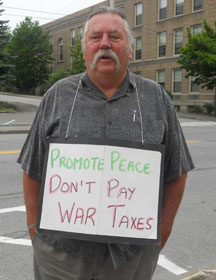(From Larry Dansinger, Maine War Tax Resource Center, via NWTRCC.org)
About 40-50 people rallied in Bangor, Maine, in support of war tax resister Frank Donnelly on June 14, 2010. Donnelly, who had pled guilty in 2009 to tax fraud, appeared in court and was sentenced to one year and one day in prison. He self-reported to the federal prison at Estill, North Carolina on July 26 to serve his sentence.
Frank Donnelly is not a typical war tax resister, most of whom try to express their values of nonviolence directly to the IRS. Some send letters to the IRS, some fill out a return but do not pay, and some don’t file at all. Donnelly knew he could not pay for war, but he did that by under- reporting his income. The IRS interpreted that as tax fraud and prosecuted him in federal criminal court.
His statement to the court was simple; he declared that he should have presented his war tax resistance differently, more openly. But, he was clear his refusal to pay sprung from his opposition to all wars.
From the Bangor Daily News, July 16, 2010:
GUEST COLUMN by Patrick O’Neill
War-tax resister unfairly portrayed by government
On July 26, my friend, Francis “Frank” Donnelly must report to a federal prison in Estill, S.C., to begin serving a year-and-a-day sentence for war-tax resistance. On June 14, Donnelly was sentenced in U.S. District Court for failing to pay his taxes. Donnelly’s case, however, was atypical.
The Bangor Daily News story about Donnelly’s sentencing reported that about three dozen peace activists stood outside the federal courthouse to show support for Donnelly’s stand as a war-tax resister.
Because he is opposed to war, Donnelly, who also faced a court-martial during the Vietnam War years, refused to pay his federal taxes because a large portion of those taxes are used to bankroll what President Dwight D. Eisenhower called the “military industrial complex.”
It was during the Vietnam War that a younger Donnelly, then in the Army reserve, landed in the brig for refusing to wear his uniform as a protest of the war. He also went on record then as a war-tax resister. At his court-martial Donnelly said he wouldn’t take his military pay or pay for war through taxes.
For those of us who stand with Donnelly in opposition to wars and killing, his stand as a war resister is laudable. At present, the United States is at war overtly in two nations, and we maintain a military presence in more than 100 nations.
At the sentencing, U.S. Attorney James McCarthy called Donnelly a “run of the mill tax cheat.” He berated Donnelly because he made a good living for a few years as a lobster broker, enough to buy a small house in Costa Rica and a lot in Florida, which is not worth very much. He also chastised Donnelly for lending some money to his friends.
He said Donnelly was wrong to apply for food stamps and heating assistance for his home in Lamoine, a modest home that he bought for $20,000 in the 1980s.
U.S. District Court Judge John Woodcock, who sentenced Donnelly, also came down hard on the defendant for not going public about his tax resistance. Woodcock, who seemed to be conflicted about how to punish Donnelly, believes civil disobedience is best expressed in the tradition of Mahatma Gandhi, who believed in open and public discourse in his peace campaigns. While Gandhi and later in the 20th century Martin Luther King Jr. expressed their direct action openly in the public square, Donnelly’s decision to quietly refuse to pay his taxes is also a valid option of war-tax resistance.
During his sentencing hearing, Donnelly said: “I am not a wealthy man.” He drives an old Buick and lives modestly in a small home.
Yet Donnelly was unfairly portrayed by the government as being greedy and hypocritical, in effect saying that his failure to pay taxes was morally invalid because he made a decent living for a few years selling lobsters, and he didn’t go public with his anti-war-tax views.
During the sentencing hearing McCarthy said Donnelly’s gross receipts for some years were more than $1 million. These figures were not accompanied by the fact that Donnelly often made just a few cents on the dollar profit as he drove a small truck 200 miles a day in his lobster business. McCarthy also read aloud a classified ad Donnelly had taken out to rent his home in Costa Rica. What did not come out was the fact that Donnelly rented the home just once for $150 and often let people use it for free.
Donnelly only applied for food stamps and heating assistance after his guilty plea last November. He is now unemployed.
When all was said and done, Woodcock sentenced Donnelly to prison, added more than $92,000 in fines and restitution and a year probation. The Internal Revenue Service has also presented Donnelly with a bill for almost $1 million for back taxes and fines, a figure that grossly distorts Donnellys income and imposes a lifelong debtors’ prison sentence on him.
After his sentencing, Donnelly said he wished he had been more transparent in his war-tax resistance, but his witness remains powerful. Another component of nonviolent resistance, one I consider more important than transparency, is the willingness of someone to accept the consequences of his or her actions, something Frank Donnelly will do July 26 when he reports to federal prison for a year.
Donnelly is paying a heavy price for his convictions, a price that few of us would be willing to make as a witness against the madness of war.
Patrick O’Neill is Cofounder of the Father Charlie Mulholland Catholic Worker House in Garner, N.C., an intentional, pacifist Christian community that provides hospitality to women and children in crisis. He and Frank Donnelly have been friends for 28 years.
